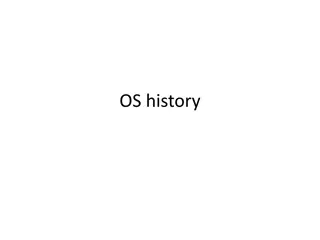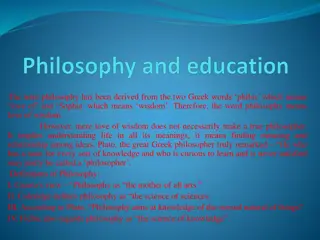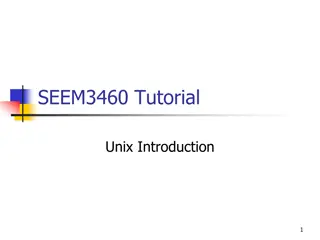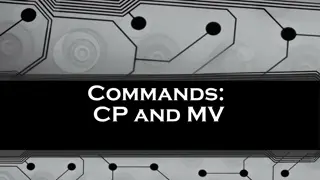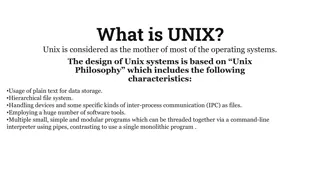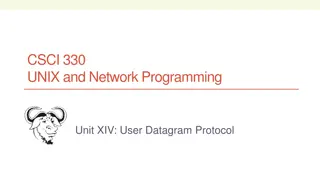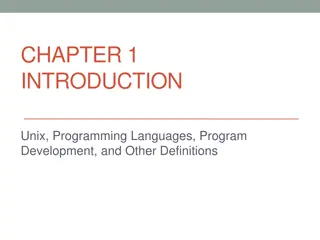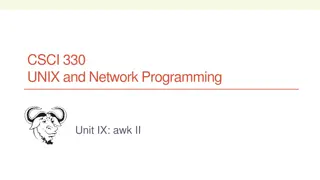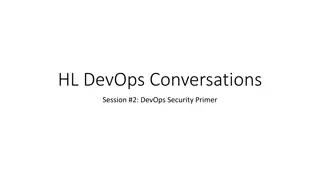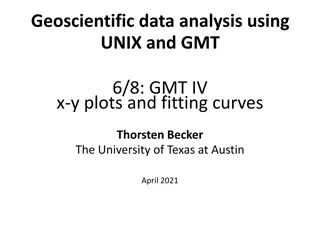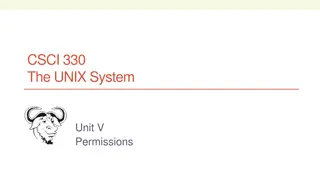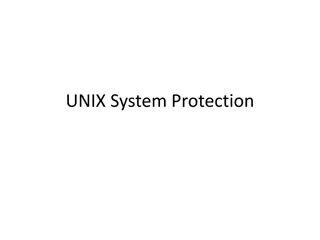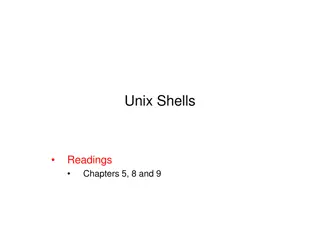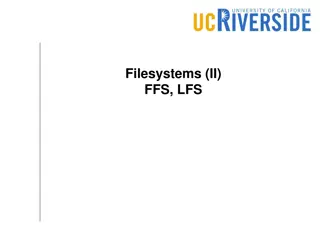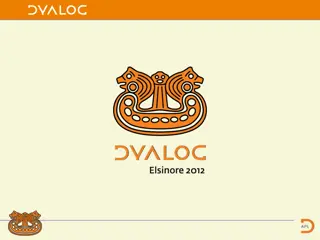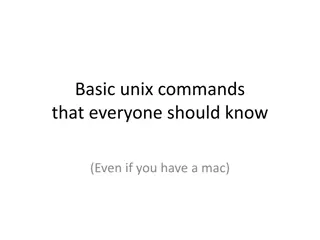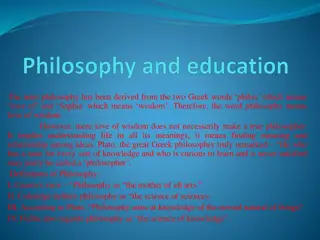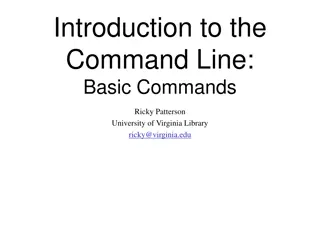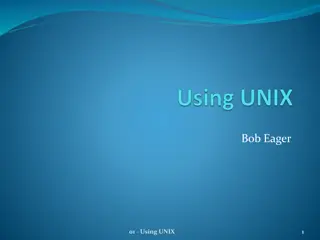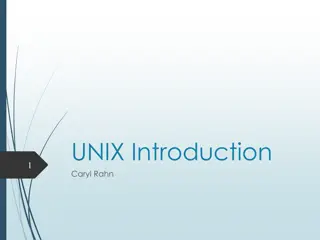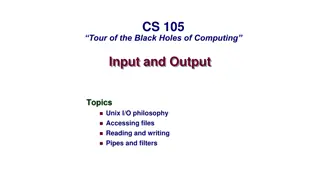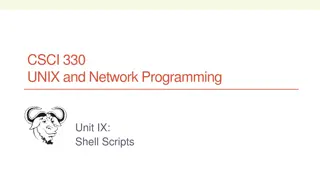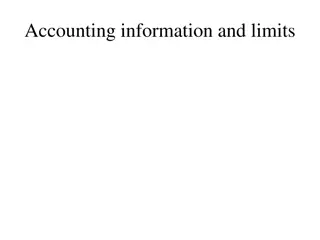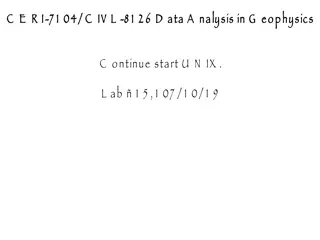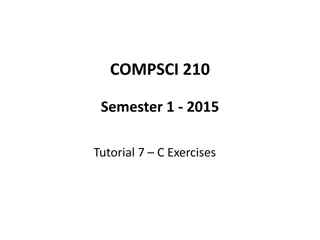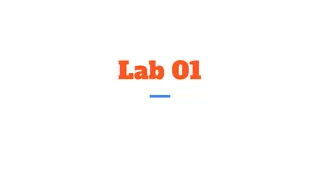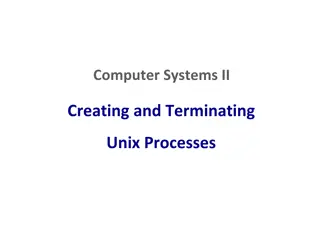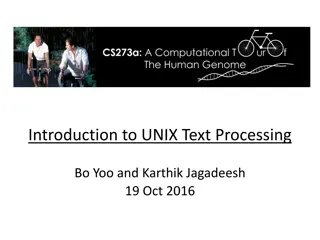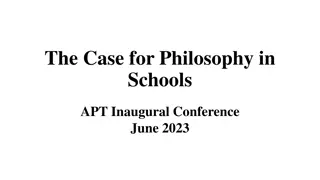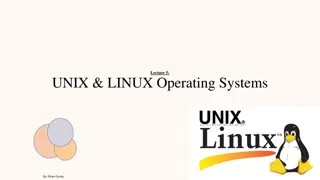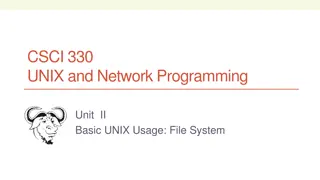Introduction to Bash Shell Programming
Learn about the fundamentals of shell programming in Unix/Linux systems, including the role of the shell as an interface between users and the operating system. Understand the components of a shell, such as the kernel, and explore different types of shells like Bourne Shell and C Shell. Discover how
6 views • 17 slides
Evolution of Operating Systems: From Mainframe Computers to Unix
Before the 1950s, users interacted directly with mainframe computers without an operating system, debugging using control panels. The transition to writing programs in symbolic languages led to the need for specific drivers. Run queues and operator-assisted job submissions marked this era. The first
0 views • 41 slides
Understanding the Essence of Philosophy: Love of Wisdom and Pursuit of Knowledge
Philosophy, derived from Greek words meaning "love of wisdom," encompasses a deep understanding of life's meanings and the interconnections among ideas. It is more than mere curiosity but a pursuit of knowledge encompassing all aspects of existence and truth. Indian philosophy views it as a vision o
0 views • 6 slides
Introduction to Unix-like Systems and Shell Interaction
Unix-like systems, such as Linux, Android, iOS, and macOS, are prevalent in various devices. The Unix shell acts as an intermediary between users and the operating system, allowing for program execution and process management. Secure Shell (SSH) and X Window System enable remote machine connections
4 views • 19 slides
Understanding the Philosophy of Social Work: A Deep Dive into Ethical Principles and Moral Philosophy
Exploring the complexity of the philosophy of social work, this text delves into ethical principles, moral philosophy, and the evolving perceptions of social workers in society, highlighting the crucial role of philosophy in shaping social work practices and principles.
0 views • 7 slides
Understanding CP and MV Commands in Unix/Linux
CP and MV commands in Unix/Linux are essential for copying and moving files or directories. CP is used to copy files with various options for different scenarios, while MV is used to move or rename files. Learn examples and practical usage of these commands to efficiently manage your files on the te
0 views • 5 slides
Understanding UNIX and Linux Operating Systems
UNIX, known as the mother of most operating systems, follows a design philosophy rooted in plain text data storage, hierarchical file systems, and modular programs. The UNIX kernel controls system functions, while Linux, a Unix-like OS, operates as a free and open-source alternative developed from s
2 views • 4 slides
Analytic Versus Continental Philosophy in the 20th Century: A Comparative Overview
In 20th-century philosophy, the divide between Analytic and Continental schools deepened but has seen recent attempts at reconciliation. Analytic philosophy emphasizes logic, language, and epistemology, requiring technical expertise, while Continental philosophy rejects metaphysical speculation and
0 views • 15 slides
Evolution of Applied Ethics in Philosophy
Philosophy, known as the love for wisdom, involves seeking fundamental truths about existence and relationships. In the 1960s and 70s, a shift towards applied ethics emerged as philosophers like Peter Singer emphasized making philosophical discourse accessible to laypersons. This shift was met with
1 views • 12 slides
Understanding User Datagram Protocol (UDP) in Unix and Network Programming
Explore the fundamentals of User Datagram Protocol (UDP) in Unix and Network Programming, covering topics such as UDP client/server programs, network layers, transport layer services, UDP packet format, and socket programming. Learn about the characteristics and usage of UDP, including its simple me
2 views • 28 slides
René Descartes: Philosopher and Mathematician Extraordinaire
René Descartes, known as the Father of Modern Philosophy, made significant contributions to both philosophy and mathematics. Born in 1596 in France, Descartes received a Jesuit education and later worked as a Corps of Engineers applying mathematics to practical applications. His philosophical works
0 views • 15 slides
Introduction to UNIX Programming Languages and Program Development
Discover the fundamentals of UNIX operating system, its significance in modern computing, directory structures, pathnames, and the role of CPU in computer systems. Learn why understanding UNIX can be essential for efficient program development and resource management. Explore the distinction between
0 views • 42 slides
Introduction to Awk: Powerful Text Processing Tool in UNIX
Awk is a versatile text processing tool in UNIX that allows users to scan files, manipulate and format data, and generate reports efficiently. With awk, users can split input lines into fields, compare them to patterns, and perform actions based on matches. This tool supports various programming con
0 views • 30 slides
Evolution of DevOps in Technology Through Images
Explore the evolution of DevOps through images showcasing key milestones from the AT&T Bell Labs UNIX era to modern DevOps teams at Google and Facebook. Delve into the analogy of a combustion engine to understand the roles of developers, operations, and orchestration in the DevOps ecosystem. Gain in
1 views • 10 slides
Geoscientific Data Analysis Using Unix and GMT: Practical Methods and Techniques
Explore techniques for analyzing geoscientific data using Unix and GMT, including handling irregularly spaced data, fitting curves, processing noisy data, and utilizing filtering methods. Learn about spline usage, polynomial fitting, correlation coefficients, and Gnuplot functionalities.
0 views • 23 slides
The Power of Unix Command Line Basics for Text Processing in Bioinformatics
Unix Shell commands such as sort, cut, uniq, join, paste, sed, grep, awk, wc, diff, comm, and cat are essential for text processing in bioinformatics. These tools allow seamless manipulation of text data without the need for intermediate files, making file processing efficient and powerful. By pipin
0 views • 19 slides
Understanding UNIX System Permissions and User Terminology
Explore the concept of UNIX system permissions, including discretionary access control (DAC) model, user terminology, file/directory access, access permission modes, categories of users, and checking permissions using examples. Learn about user IDs, groups, superuser privileges, ownership, access mo
0 views • 24 slides
Overview of UNIX System Protection
UNIX System Protection focuses on ensuring security and access control mechanisms within the UNIX operating system. Developed in 1969 by Dennis Ritchie and Ken Thompson at AT&T Bell Labs, UNIX features design elements like a portable API, protection rings, kernel processes, and a trusted computing b
0 views • 12 slides
Understanding Unix Shells: A Comprehensive Overview
Explore the fundamentals of Unix shells, including their role as an interface between the Unix kernel and users, different shell types like Bourne, Korn, and Bourne-again shells, shell startup files, environment variables, and more. Learn how shells interpret and run commands, manage aliases, and co
0 views • 40 slides
Philosophy of Biology: A Methodological Provocation Before the Emergence of Biology
Philosophy of biology before the formal establishment of biology as a discipline explores the evolution of terms and theories related to the science of life. By delving into key philosophical works from the 19th and 20th centuries, the interaction between history, philosophy, and science in the fiel
0 views • 13 slides
CS252 Systems Programming Course Overview
This course overview covers topics such as C programming review, Unix basics, Unix systems programming, and grading details. The course includes labs on C/C++ programming, Unix shell scripting, and writing your own shell. Communication is emphasized through Piazza for questions/answers and Blackboar
0 views • 41 slides
Understanding Philosophy: Day 1 Topics and Discussions
Explore the fundamental aspects of philosophy in Day 1 of the course "Possible Worlds" by Cathy Legg at the University of Waikato. Delve into topics such as the relevance of studying philosophy, metaphysics, defining time, and different forms of possibility and necessity. Engage in thought-provoking
0 views • 25 slides
Understanding Filesystems and Inodes in UNIX
Delve into the complexities of filesystems such as FFS and LFS, exploring concepts like i-nodes, ownership, permissions, and indirect blocks. Learn about the structure of UNIX inodes, path searching, caching, read-ahead optimization, and the limitations of the original UNIX filesystem. Unravel the i
0 views • 24 slides
Dyalog APL on UNIX - Development Environment Overview
Discover the supported platforms for Dyalog APL on UNIX, including AIX and various Linux distributions. Learn about driving APL on UNIX, using PuTTY for Windows clients, configuring terminal windows, and running TryAPL as a service. Get insights on setting up Dyalog APL on Linux and explore keyboard
1 views • 39 slides
Essential Unix Commands for Beginners
Learn essential Unix commands such as pwd, ls, cd, mkdir, and man, along with their functionalities and usage in navigating the Unix file system effectively. Understand the basics of directories, file structures, and how to get help using the command line interface.
0 views • 18 slides
Understanding Philosophy: The Search for Wisdom and Truth
The term "philosophy" originates from Greek words meaning "love of wisdom." True philosophy involves seeking meaning and connections among ideas, transcending mere curiosity. Various definitions emphasize philosophy as the foundation of all arts, the science of sciences, and the pursuit of eternal k
0 views • 6 slides
Introduction to the Command Line: Basic Commands and Unix Systems
This material provides an overview of fundamental commands in Unix systems, applicable to both Unix and Linux operating systems. It covers topics like directory structure, text file manipulation, file permissions, redirections, pipes, wildcards, and more. Learn about the nature of Unix systems, how
0 views • 43 slides
Introduction to Using UNIX: A Comprehensive Guide
Explore the rich history and practical benefits of using UNIX systems. Learn about the UNIX user interface, the significance of command line interactions, the philosophy of small programs, and the evolution of graphical interfaces. Discover why mastering UNIX skills is valuable for computing student
0 views • 29 slides
Understanding UNIX Operating System
UNIX is a versatile operating system that enables multi-user access, multitasking, and portability across various computing environments. It serves as the foundation for many modern operating systems and has influenced concepts incorporated in Microsoft Windows and DOS. The UNIX system comprises dis
0 views • 51 slides
Exploring Unix Input and Output Topics in CS.105
Dive into the Unix I/O philosophy, understanding pathnames, conventions, and file structures. Learn how Unix revolutionized file handling with its unified approach and discover the power of accessing files, reading/writing, pipes, and filters. Gain insights into Unix file conventions and the flexibi
0 views • 29 slides
Introduction to Shell Scripting in UNIX and Network Programming
Shell scripts in UNIX and network programming provide a powerful way to automate tasks, simplify recurring operations, and enhance system administration. They leverage variables, decision-making control, looping abilities, and function calls to streamline processes. With essential features like file
0 views • 32 slides
Process Management in UNIX Systems
Explore the intricate process management mechanisms in UNIX operating systems, covering the suspension, activation, and destruction of processes along with resource allocation and priority handling. Delve into the scheduling intricacies of UNIX environments for optimal performance.
0 views • 18 slides
Introduction to Data Analysis in Geophysics Using UNIX
Learn how to use UNIX commands such as pipes and xargs in geophysics data analysis. Discover how to manipulate file lists, search for specific strings in files, and run programs on file names efficiently using xargs in a UNIX environment.
0 views • 34 slides
Introduction to UNIX Commands and Basic C Programming Exercises
This content guide provides step-by-step instructions on downloading, unpacking, and using examples in UNIX environment, connecting to a university UNIX account from Windows using Putty, logging in with UPI and password, and running basic C programming exercises. It also covers basic Linux commands
0 views • 13 slides
Understanding UNIX Operating System and File System
UNIX is a powerful operating system developed in the 1960s that forms the basis for modern systems like Linux. It manages hardware communication for users and programs. The file system organizes files in a hierarchical structure, with directories acting as folders. Learn about directories, subdirect
0 views • 19 slides
Understanding Unix Process Management in Computer Systems II
This overview delves into the creation, termination, memory layout, and dynamic memory management of Unix processes in Computer Systems II. It covers the distinctions between code, executables, and processes, the memory layout of Unix processes, management of heap memory using malloc and free functi
0 views • 27 slides
Mastering UNIX Text Processing: Tips and Tricks
Explore the world of UNIX text processing through a comprehensive guide covering essential commands, efficient workflows, and powerful combinations. Learn how UNIX commands streamline tasks, eliminate redundant code, and enhance productivity. Discover the art of piping, output redirection, and utili
0 views • 48 slides
Unlocking the Creative Potential of Philosophy in Schools
Exploring the unique benefits of teaching philosophy in schools as a comprehensive package, this discussion emphasizes the creative aspects of philosophy, such as philosophic imagination and diverse styles, alongside traditional analytical approaches. By incorporating thought experiments, counterfac
0 views • 24 slides
Overview of UNIX and Linux Operating Systems
The UNIX brand encompasses a range of powerful multitasking, multiuser operating systems used by various organizations to develop IT technologies. UNIX internals consist of kernel space and user space, with programs accessing system services rather than hardware directly. The Unix filesystem is a ke
1 views • 36 slides
Introduction to Basic UNIX Usage and Network Programming
In this course, you will learn the fundamentals of UNIX usage and network programming. Topics covered include basic UNIX commands, file system structure, UNIX shell functionalities, command line structure, and essential commands like passwd, ls, more, logout, date, and man. Understanding the hierarc
0 views • 31 slides

